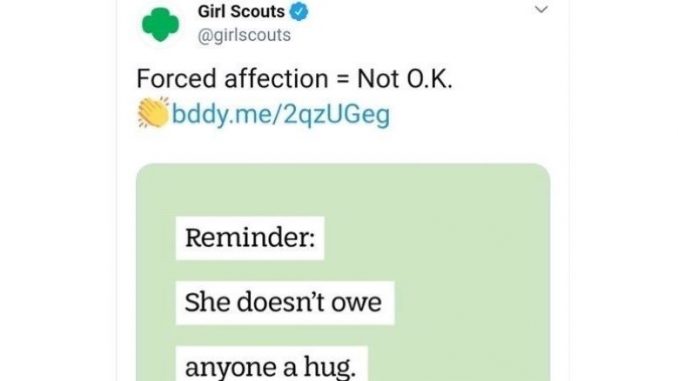
Ah, the Holiday Season is upon us, bringing with it the nostalgia of memories past: the lights, the travel, the music, the homemade goodies, family meals, songs, sweet smells, gifts…
…and Aunt Betsy, smelling of a strange mix of moth balls and Chanel #5, imploring the children to give her a hug. Or Grandpa George, with his 5 o’clock shadow, whiskey and cigar in hand, offering the girls a quarter for a kiss or giving the boys a noogie.
Surely you remember THOSE relatives and the social pressure to allow them near you; with Mom or Dad telling you to go ahead–give them a hug, and don’t complain.
Some of us look back and shudder–maybe there really was a predator in the midst of the family gathering. But most of us can probably understand the situation for what it was–a lonely elderly person, thrilled to be around family and especially joyful at seeing the children while remembering their own holidays past. Showing affection is a way for them to connect the past to present, and reclaim their sense of belonging and love.
RELATED NEWS: Nobody Needs An AR-15? These Folks Did
The Girl Scouts of America have a different perspective on that. They believe it’s wrong to tell a girl that she needs to hug someone. Telling girls that they need to shower with biological males?
Apparently that’s okay.
The Girl Scouts’ website makes clear that membership is contingent upon whether “the child is recognized by the family and school/community as a girl and lives culturally as a girl,” even if “she” is biologically male.
RELATED NEWS: Texans Who Carry Have A Lower Murder Rate Than Brits
That would seem to violate the group’s stated goal of offering an “all-girl, girl-led, and girl-friendly environment.” It also violates the idea that girls should have the final say over who they want to be around in vulnerable situations.
But there’s a reason why the Girl Scouts and other feminist organizations want to push this selective concept of autonomy, privacy, and consent: to promote disdain for the elderly, and men in particular, along with the idea that oneself should be above the needs of others.
RELATED NEWS: 10 Mass Shootings That Were Stopped By Armed Citizens
Everyday, young people are encouraged to make themselves the center of the universe and to ignore the people around them if it is more convenient to do so. It’s why we have a culture of death, a host “me too” hoaxes, and entitlement to almost everything imaginable. They are taught that another person’s needs don’t really matter–it’s not incumbent upon them to make any sacrifice for another’s well-being.
Hugging a relative, even when you don’t want to, is a sacrifice given for that person’s well-being. We’re systematically telling children to disrespect their elders, to ridicule the needs of others, and always–no matter what–place themselves first.
Imagine a 90-year-old grandma, who's great-grandchildren, that she rarely gets to see, adamantly refuse to give her a hug or even talk to her because she's old, wrinkly, maybe smells funny, and talks with a wavering voice. And the mother of these children just shrugs her shoulders, rolls her eyes, and says, "Grandma, they have to give consent and I won't make them."
RELATED NEWS: If Late-Term Abortion Isn’t Torture, What Is?
It would behoove us all to remember that we will not remain forever young. Someday, we'll be that relative that a child looks at in disgust, and we'll long for the affection of family and friends that we remember from our youth. We'll wish the children would just be nice and not so hurtful. We'll wonder why we're so lonely and what we did wrong to make the children see us as disposable.
Every year this seems to be a big feminist and social media issue. Should children, particularly girls, be forced to violate their bodily autonomy and privacy, going against the cult of consent?
RELATED NEWS: Here Are 10 Child Rapists Planned Parenthood Helped
Yes, boys and girls should be made to hug and talk to their relatives. They should be encouraged to respect their elders. Parents should lead by example, showing that leaving our comfort zone isn't always a bad thing, and can sometimes mean the world to someone else.
Obviously, parents have to assess the situation to determine if it is prudent to encourage their children to express a quick display of physical affection for a relative or family friend. If a parent is uneasy about it or there are known issues, then by all means step in and protect your child.
Otherwise, giving a few seconds of happiness isn't too much to ask.
What do you think? Leave a comment below.
Be the first to comment